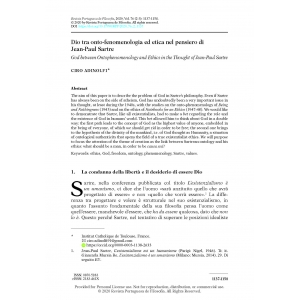Anderson, Thomas. Sartre’s two Ethics. From Authenticity to Integral Humanity. Chicago: Open Court, 1993.
Cabestan, Philippe. L’Être et la conscience. Recherches sur la psychologie et l’ontophénoménologie sartriennes. Bruxelles: Ousia, 2004.
Chrétien, Jean-Louis. “Une morale en suspens.” In Reconnaissances philosophiques, 123-143. Parigi: Les éditions du cerf, 2010.
Daigle, Christine. “The Ethics of Authenticity.” In Reading Sartre. On phenomenology and existentialism, edited by Jonathan Webber, 1-14. New York: Routledge, 2011.
Descartes, René. Discours de la methode. Leida 1637. Tr. it. di Monica Barsi e Alessandra Preda, Discorso sul metodo. Milano: BUR, 2011.
Descartes, René. Meditationes de prima philosophia. Parigi 1641. Tr. it. Sergio Landucci, Meditazioni metafisiche. Roma-Bari: Laterza, 1997.
Gardner, Sebastian. “Sartre, Schelling, and onto-theology.” Religious Studies 42, (2006): 1–25.
Henry, Michel. L’essence de la manifestation. Parigi: PUF, 1963.
Pascal, Blaise. Pensées. Parigi 1670. Tr. it. Paolo Serini, Pensieri. Torino: Einaudi, 1962.
Renxiang, Liu. “Sartre’s Godless Theology: Dualist Monism and Its Temporal Dimensions.” Open Theology 5, (2019): 182–197, https://doi.org/10.1515/opth-2019-0017.
Russo, Maria. “Necessità e libertà in Sartre. Tra il progetto incompiuto di un’etica esistenzialista e il materialismo di Critica della ragione dialettica.” Studi Sartriani 12, (Roma: Roma Tre-press 2018): 39-58.
Sartre, Jean-Paul. “La liberté cartésienne”, in Situations I. Parigi: Gallimard, 1948. Tr. it. Nestore Pirillo, La liberté cartésienne. Dialogo sul libero arbitrio. Milano: Christian Marinotti Edizioni, 2007.
Sartre, Jean-Paul. “Une idée fondamentale de la phénoménologie de Husserl: l’intentionnalité”, in Situations I. Parigi: Gallimard, 1947.
Sartre, Jean-Paul. Critique de la raison dialectique. Tome II. Parigi: Gallimard, 1985. Tr. it. Florinda Cambria, L’intelligibilità della Storia. Critica della Ragion dialettica. Tomo II. Milano: Christian Marinotti Edizioni, 2007.
Sartre, Jean-Paul. L’être et le néant. Essai d’ontologie phénoménologique. Parigi: Gallimard, 1943. Tr. it. Giuseppe Del Bo, L’essere e il nulla. Milano: il Saggiatore, 2014.
Sartre, Jean-Paul. L’existentialisme est un humanisme. Parigi: Nigel, 1946. Tr. it. Giancarla Mursia Re, L’esistenzialismo è un umanismo. Milano: Mursia, 2014.
Sartre, Jean-Paul. La transcendance de l’Ego. Esquisse d’une description phénoménologique. Parigi: Vrin, 1965. Tr. it. Nestore Pirillo, La trascendenza dell’Ego. Milano: Christian Marinotti Edizioni, 2011.
Sartre, Jean-Paul. Verité et existence. Parigi: Gallimard, 1946. Tr. it. Francesco Sircana, Verità e esistenza. Milano: il Saggiatore, 1991.
Scanzio, Fabrizio. Sartre et la morale. La réflexion sartrienne sur la morale de 1939 à 1952. Napoli: Vivarium 2000.
Simont, Juliette. “Sartrean ethics.” In The Cambridge Companion to Sartre, edited by Christina Howells, 178-210. New York: Cambridge University Press, 1993, https://doi.org/10.1017/ccol0521381142.007.
Simont, Juliette. Jean-Paul Sartre. Un demi-siècle de liberté. Louvain-la-Neuve: De Boeck, 2015. https://doi.org/10.5195/jffp.1999.422.
Spinoza, Baruch. Ethica More Geometrico Demonstrata. Amsterdam 1677. Tr. it. Filippo Mignini e Omero Proietti, “Etica”, in Opere. Milano: Mondadori, 2008, https://doi.org/10.1524/9783050050218.1.
Webber, Jonathan. The Existentialism of Jean-Paul Sartre. New York: Routledge, 2009.
Zheng, Yiwei. “Sartre on Authenticity.” Sartre Studies International 8, 2 (2002): 127-140.









